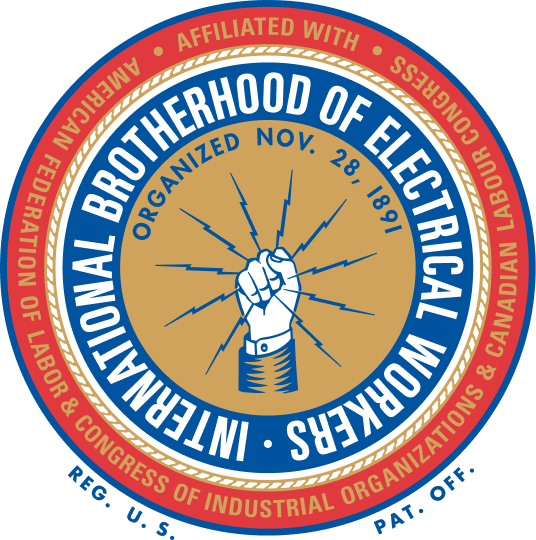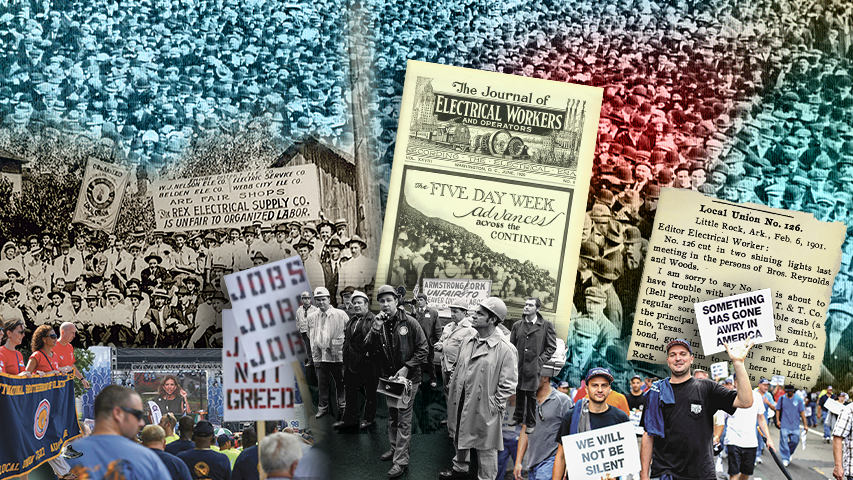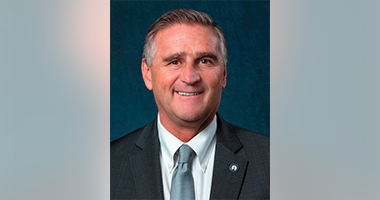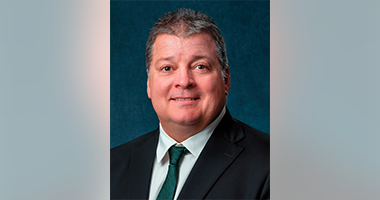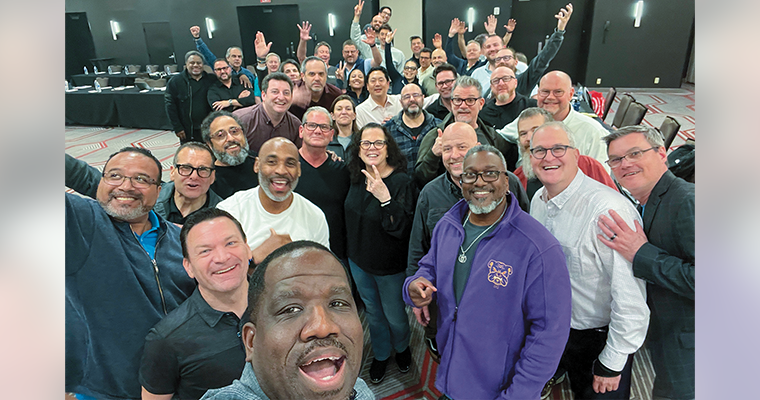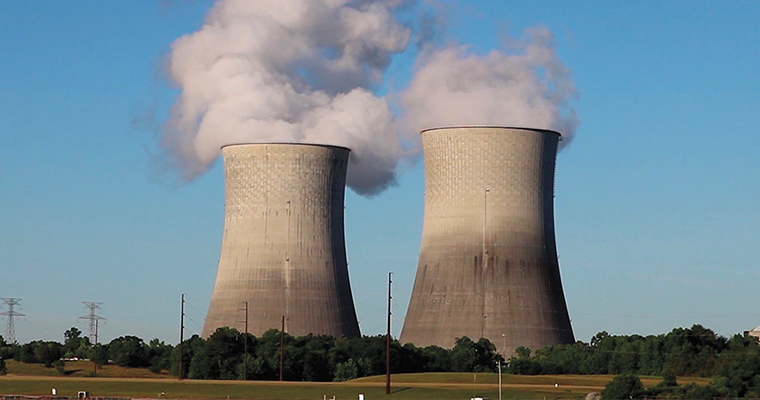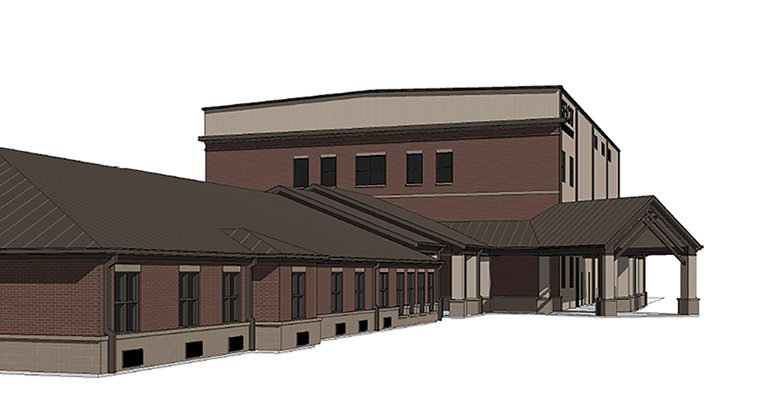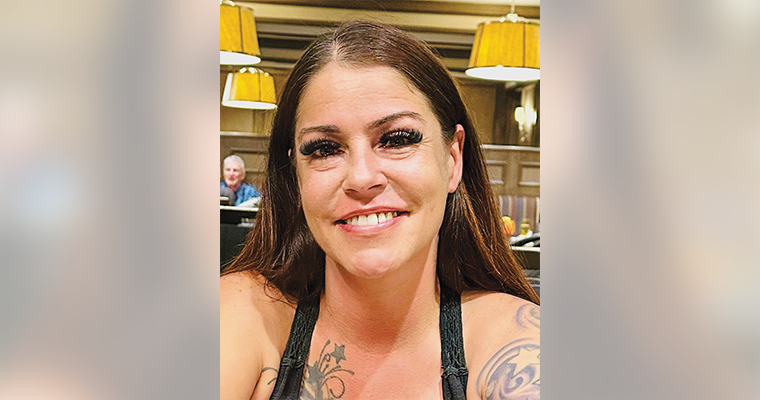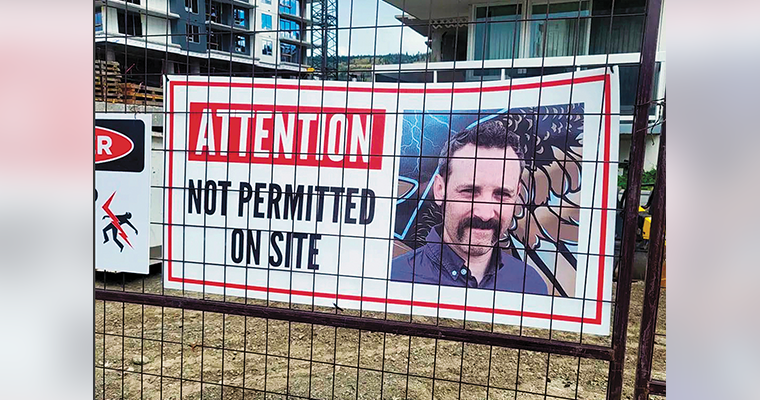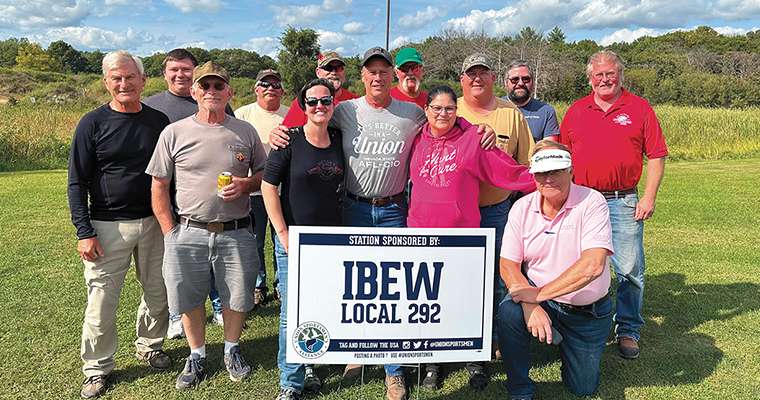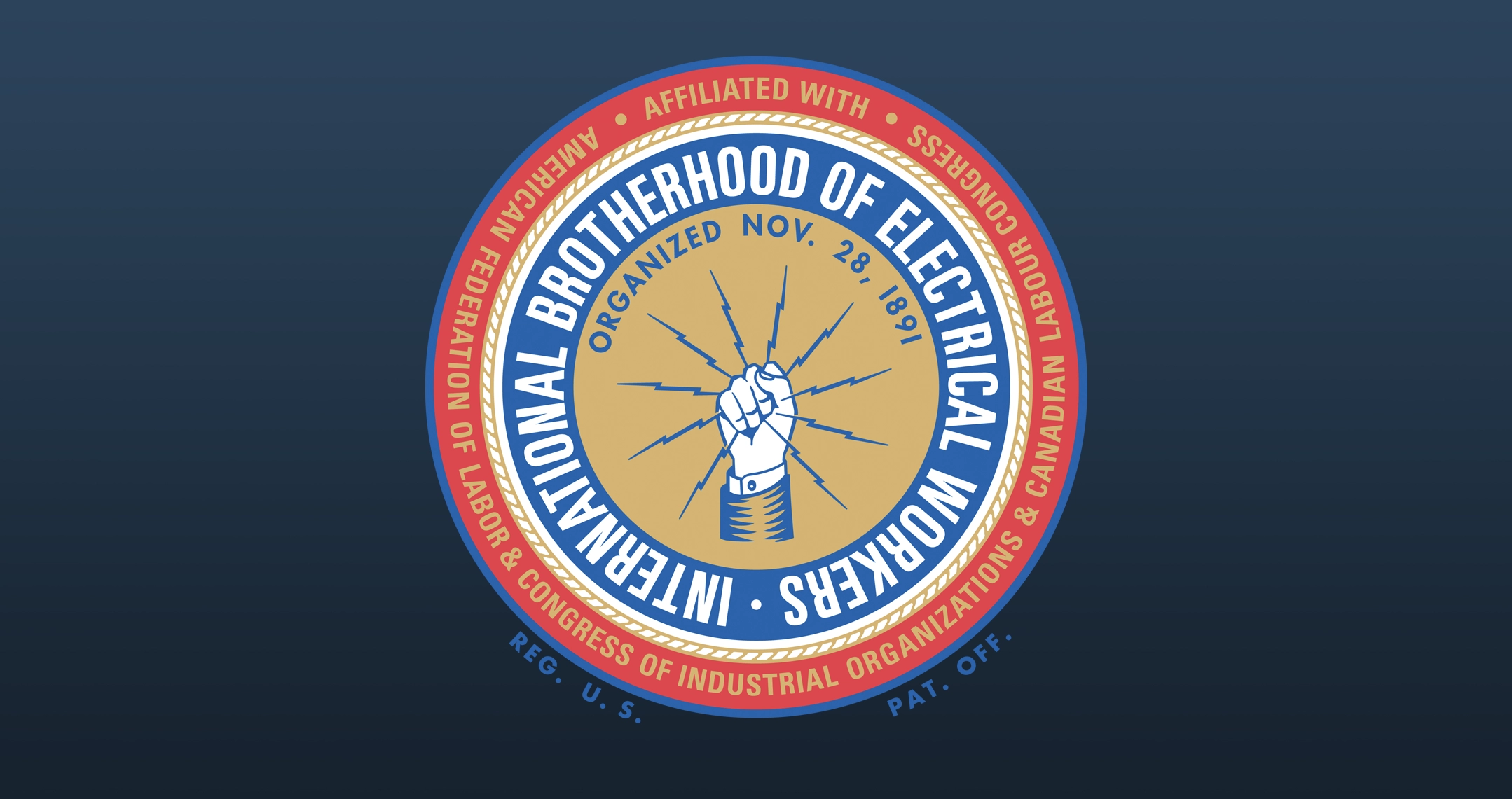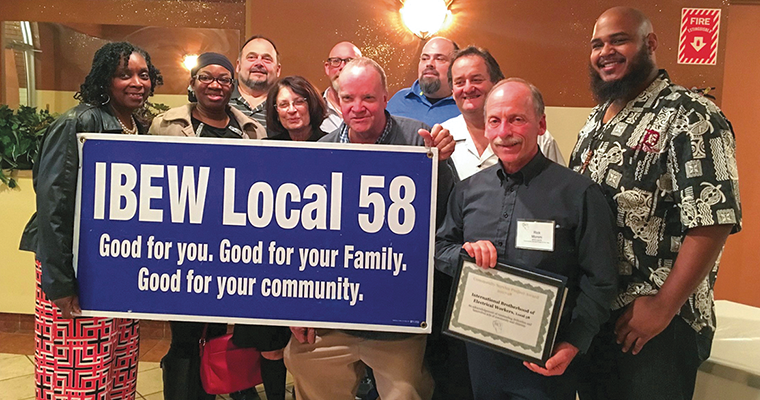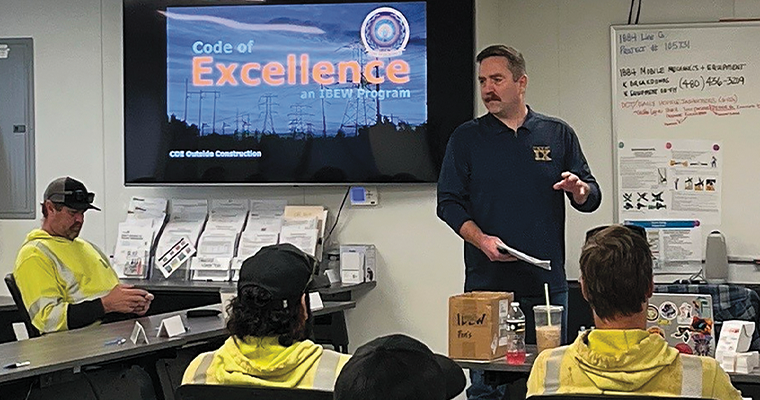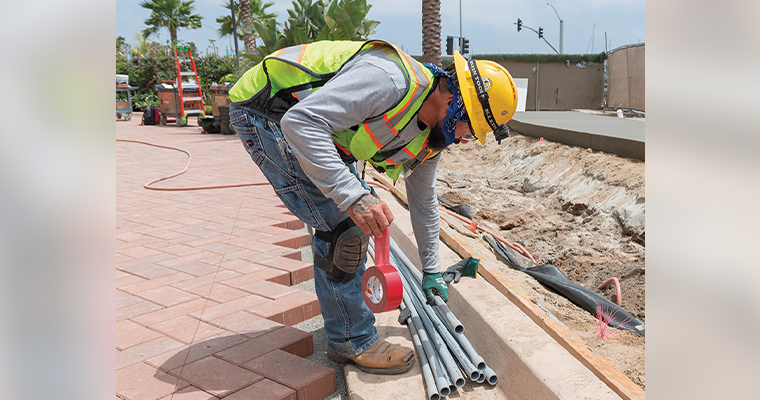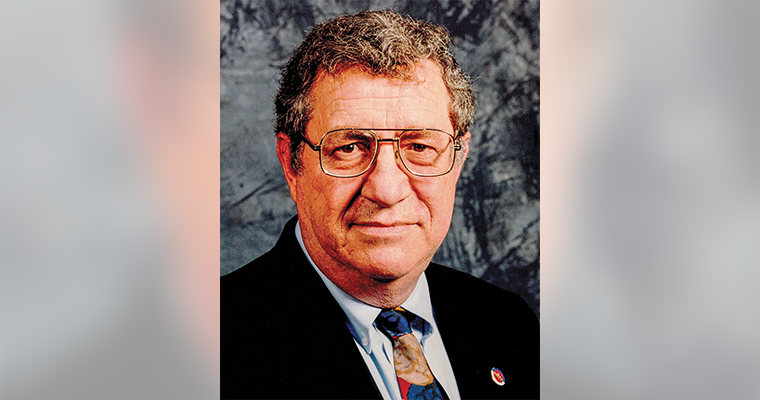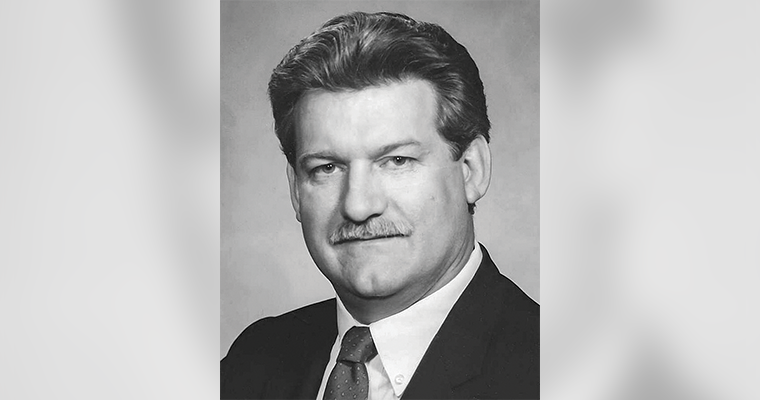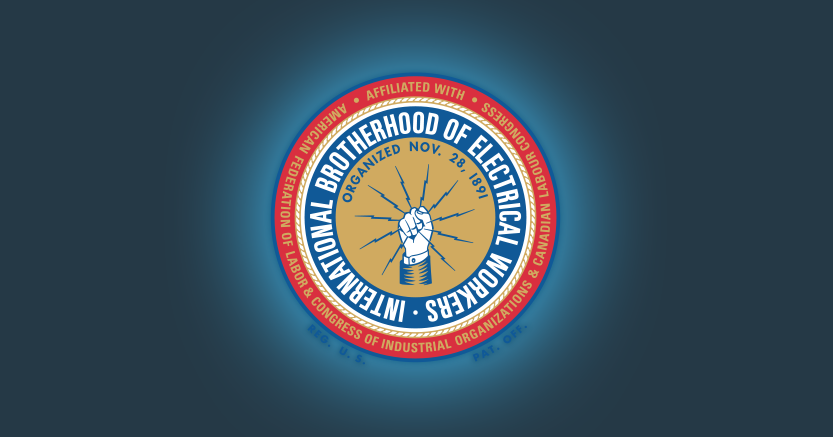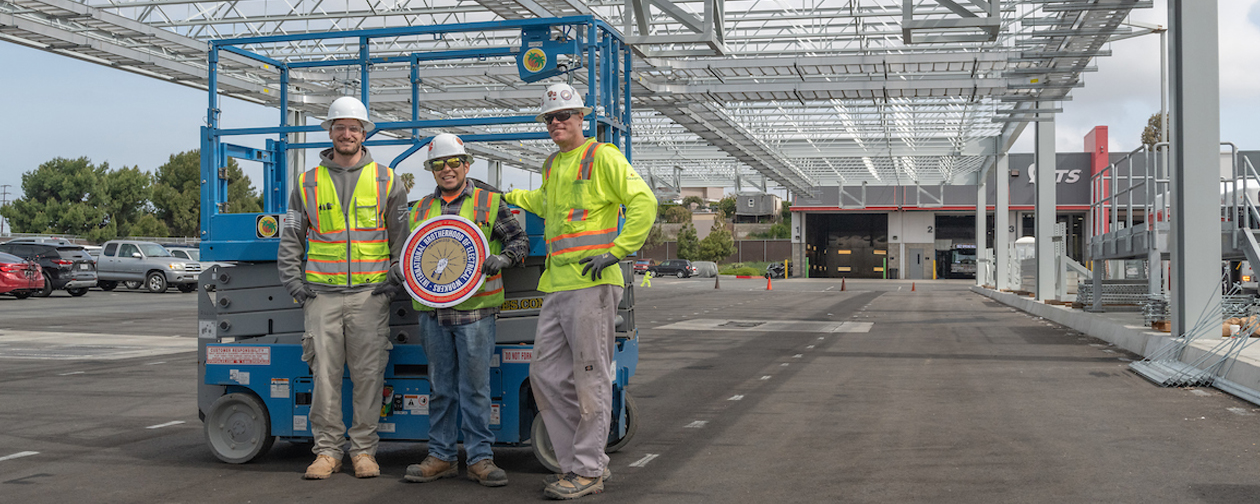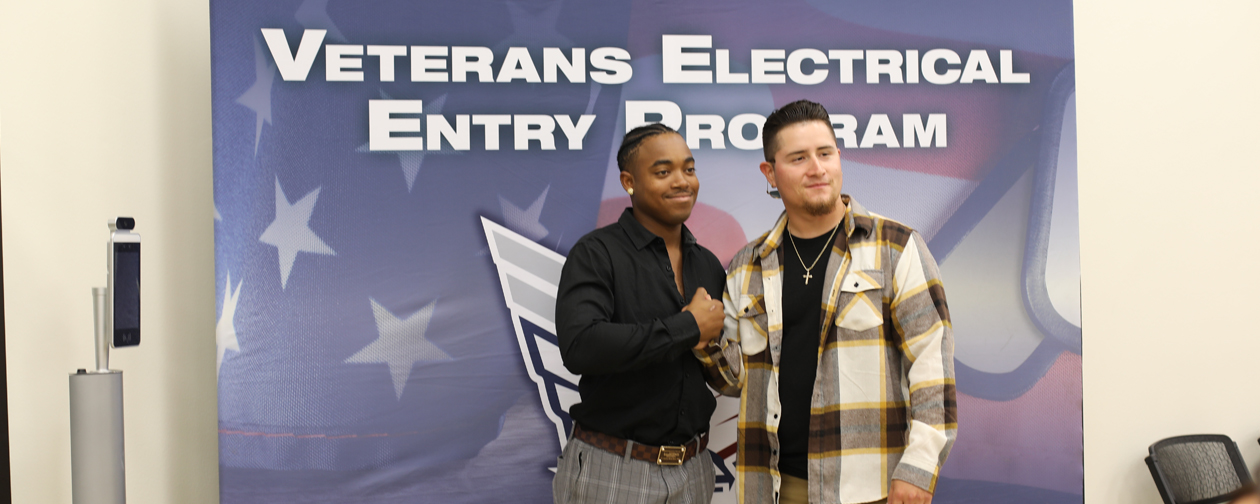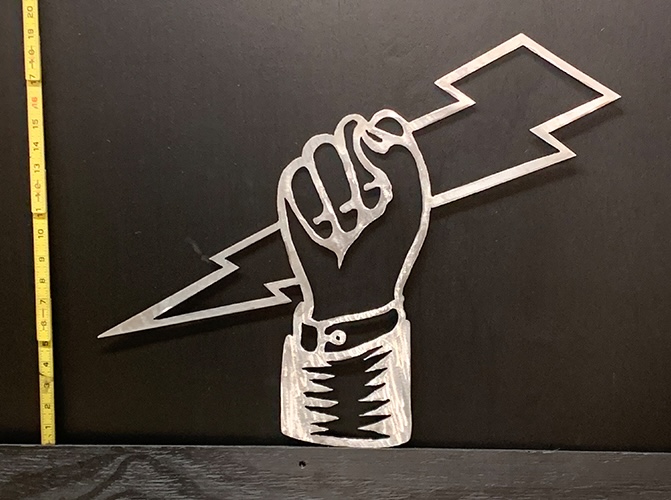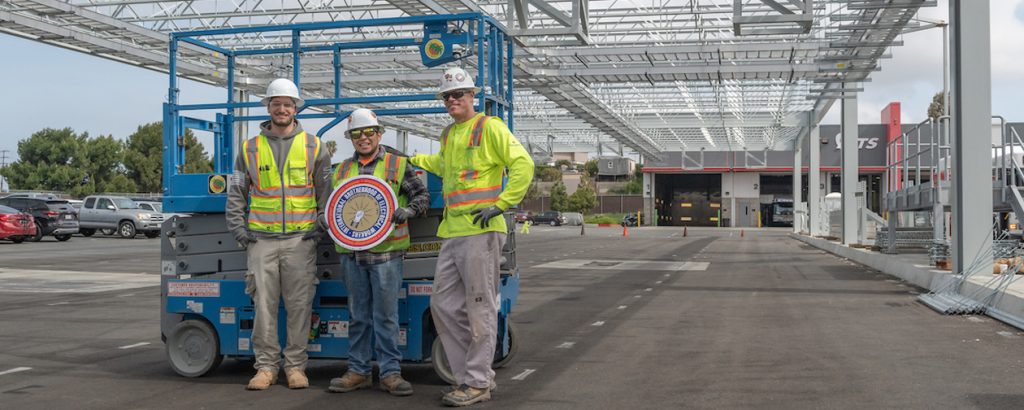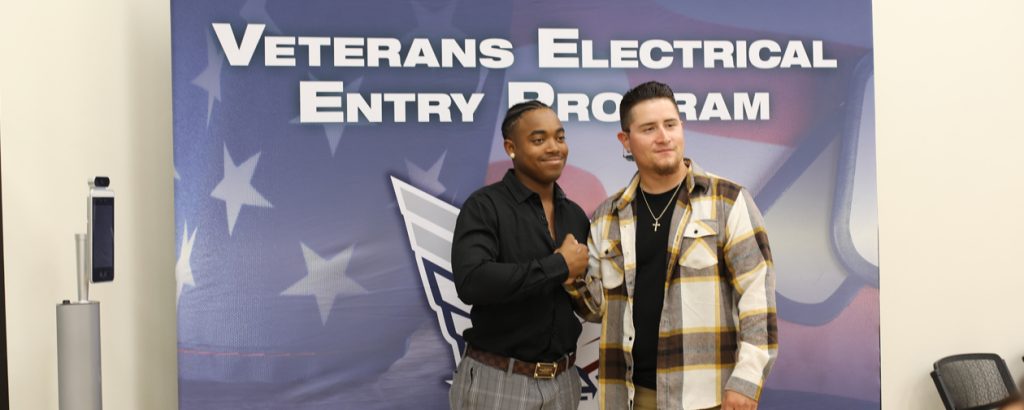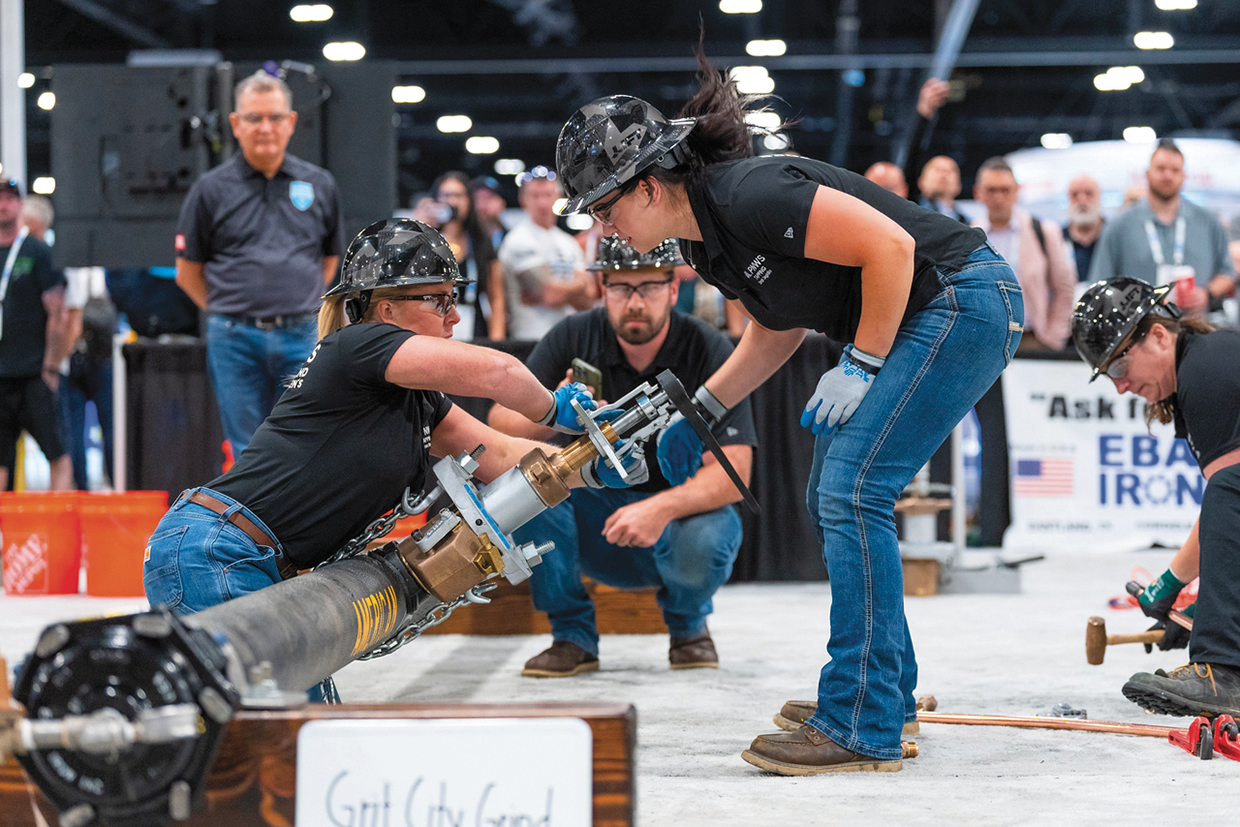
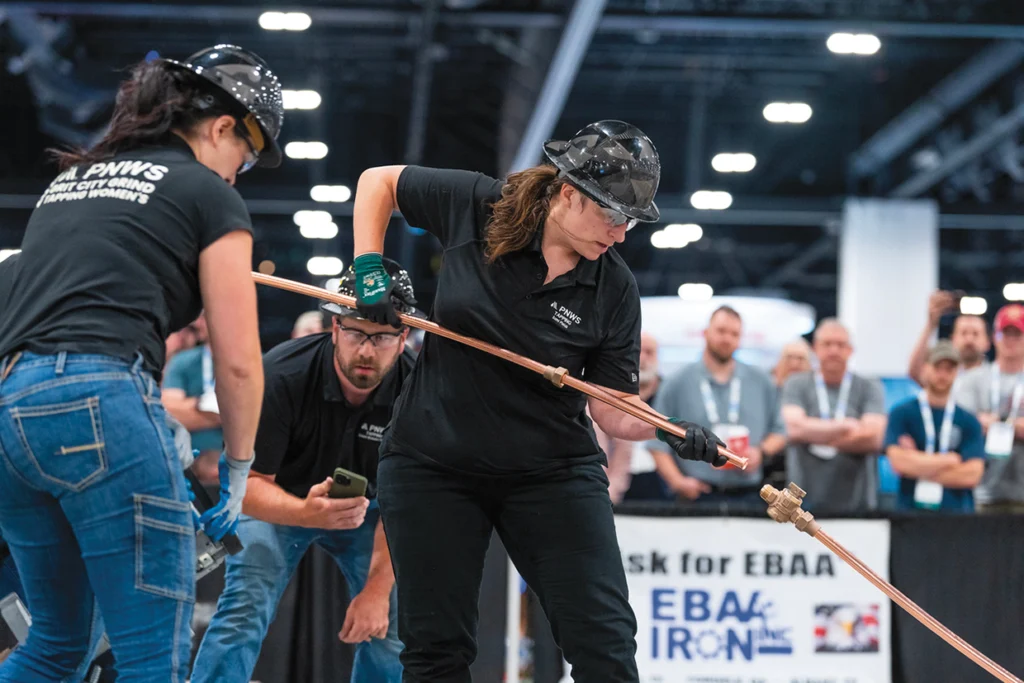
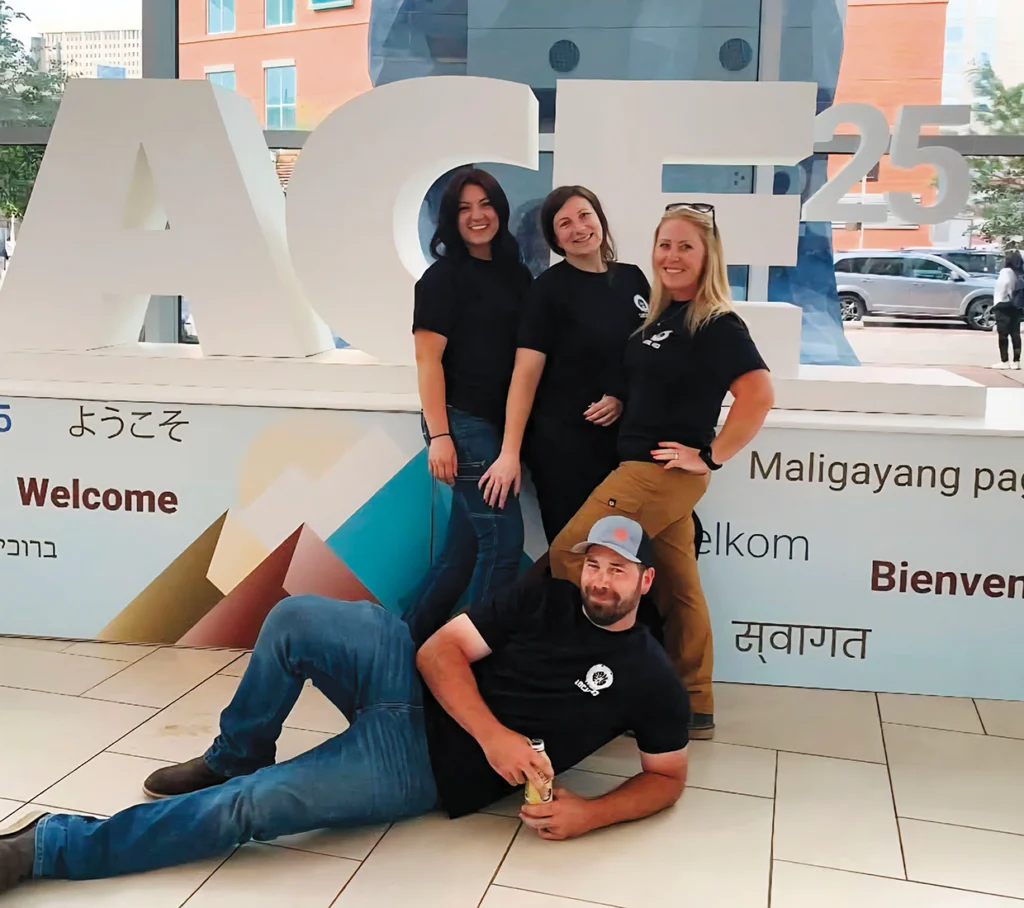
Top: Champion pipe tappers and Tacoma, Wash., Local 483 members (from left) Sarah Degidio, Sami Pielak and Jessa Messer, along with coach Brandon Corey, representing Tacoma Water at the 2025 American Water Works Association conference. The team won the women’s national title for the second straight year, installing a water service line in less than two and a half minutes. Competition photos courtesy of AWWA
On either side of a pressurized water pipe, the women known as Grit City Grind rapidly cranked and tapped and flared and tightened with the muscled arms of athletes, delivering all the tension and thrills of a buzzer-beater ballgame.
In two minutes and 19 seconds — officially 2:29.47 with minor penalties — the Washington state trio from Tacoma Water and Local 483 had connected a water service line, besting their six pipe-tapping competitors at an industry conference in Denver in June and taking the women’s national title for the second straight year.
“At first, we were exhausted and just trying to catch our breath while the judges checked our work, so it took a minute to realize that we met our goal — to win two years in a row,” Jessa Messer said. “Next year, we’re going for a three-peat.”
Their track record at the annual American Water Works Association conference bodes well: In their first year as teammates in 2023, Messer, Sarah Degidio and Sami Pielak took second place, and now they are two-time champions.
Between their physical work in the field for Tacoma Water and intense training on their own time, the women have only gotten stronger, swifter and more strategic.
Or as Pielak summed it up, with levity: “We’re kind of all-around badasses.”
Mike McCaffrey called the women “phenomenal,” and he ought to know: He coached the Tacoma Water men’s pipe tapping this year after 20 years of competing, which included a national title in 2009.
“At first, we were exhausted and just trying to catch our breath while the judges checked our work, so it took a minute to realize that we met our goal — to win two years in a row.”
– Team member Jessa Messer, Tacoma Local 483
“No other men’s or women’s teams in the Pacific Northwest section have ever won twice,” McCaffrey said, getting choked up as he described watching the women learn and hone their craft. “It’s the same thing we do in the field, but to watch them do it on a timer on a carpet in front of a crowd, I’m just so proud of them.”
IBEW leaders and management at Tacoma Water feel the same way.
“I was ecstatic but not surprised,” Local 483 Business Manager Byron Allen said. “I know how much they have each other’s backs and how hard they train. They sacrifice a lot of personal time to excel as much as they have.”
Tacoma Public Utilities Director Jackie Flowers said seeing the women in action “just makes you go wow!”
“It’s fantastic to watch people who are at that level of proficiency in their craft,” Flowers said. “The team is like a well-oiled machine. Everyone has a job to do, and they do it with such skill and precision.”
The team said Flowers has been one of their biggest fans. “She’s always cheering us on,” Messer said. “We’re grateful to her and the TPU board for their support and making it possible for us to participate in the competitions.”
The Grit City Grind — a nod to Tacoma’s unofficial nickname as more hardscrabble than neighboring Seattle — scored 28 seconds ahead of its nearest competitor, the Alamo City Tappers from San Antonio, who came in at 2:57.75.
Crouched down, gauging the team’s every move, coach Brandon Corey was confident of another victory, mindful of errors that result in penalty seconds being added to the stopwatch time.
“I knew immediately it was a winning run,” said Corey, a water service supervisor who worked with, and was impressed by, all three women during their two-year apprenticeships.
“I paid enough attention to know that we had no safety violations,” he said. “I knew the corp stop was threaded far enough in and that the curb stop was low enough to the ground. I immediately began inspecting for leaks and noticed that there was nothing spraying. So I was doing the math in my head and knew that even if we had a couple of drips, we’d win.”
Pipe tapping is a major part of Messer and Pielak’s day jobs as water service workers, which involves pipe and meter installation, maintenance and repairs.
“It varies day to day, but we get calls to go out and troubleshoot issues that customers or contractors are having,” Messer said. “It’s usually a matter of the water being out, or a contractor could have hit something and broke a pipe and there’s water flying, those kind of emergency calls.”
Degidio got pipe tapping experience while an apprentice before specializing in fire hydrants. “There are over 14,000 hydrants in our system,” she said. “We do maintenance and service, and if they get hit by a car, we’re the ones who go out and repair them.”
The women train for months leading up the regional and national competitions — typically two or three nights a week for about 90 minutes after work, a commitment that requires juggling childcare schedules. Not only are they all mothers, but Pielak was six months pregnant when the team won the 2024 title.
This year was Corey’s first with the team, after the women’s previous coach moved to a job out of state. Newly a supervisor — the highest position at Tacoma Water in the bargaining unit — Corey had been a popular lead worker and was the women’s unanimous choice.
“He’s a phenomenal lead. He’s fair, he’s efficient, he’s knowledgeable. He’s everyone’s favorite to work with,” Messer said, the teammates laughing as Pielak added, “But we wondered, ‘Can he handle us?’”
Corey wasn’t daunted. “This is a male-dominated field and the fact that they’ve fit into it says a lot about their personalities and attitudes,” he said. “They put a lot of heart into what they do, so when they asked, I didn’t really hesitate.”
As driven as they are to win, the women said one of the best parts of going to the national competition is getting to know their opponents, who face similar challenges in what have been traditionally male careers.
“The camaraderie is amazing,” Degidio said. “We’ve been going to the national competition for three years — we went to Toronto and Anaheim and now Denver — and we’ve been building a relationship with these other women.”
“Everyone is just so encouraging and supportive, even though you’re competing against them for a pretty big title,” Messer said. “You all have the same feelings of nervousness and excitement.”
While the team is sponsored by Tacoma Water, the women said their union’s support has also been invaluable.
“I really want to give a shout-out to our local,” said Pielak, a past member of Local 483’s bargaining committee. “Three years ago, after COVID, they really helped us get the ball rolling again, and they’ve been a big part of our success.”
Allen, himself a journeyman lineman, said many people don’t realize that water workers are part of the IBEW.
“When people hear ‘IBEW,’ all they think about is electricity,” he said. “But our water workers take extreme pride in what they do.
“Something one of them said years ago really drove it home for me: A person can live without electricity. But you can’t live without water. And when that clean, drinkable water comes out of your tap, you have workers like our members to thank for it.”
